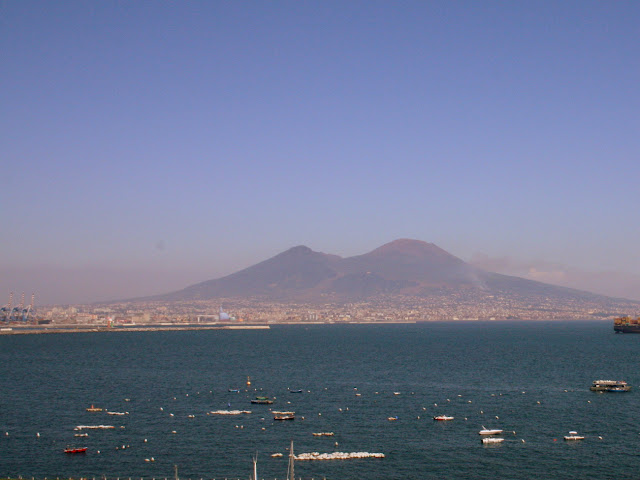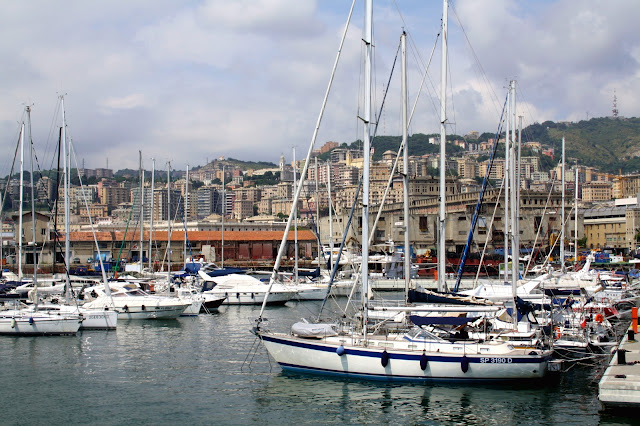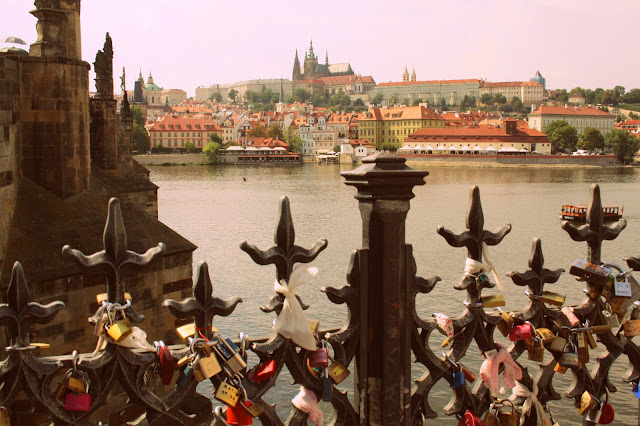„…ten piekielny obraz żużlowych skał” – Wezuwiusz oczami Juliusza Słowackiego /” …the hellish image of cinder rocks” - Vesuvius through the eyes of Juliusz Słowacki
Juliusz Słowacki wybrał się na Wezuwiusz w czerwcu 1836, podczas
swojego trzymiesięcznego pobytu w Neapolu (o którym tutaj). Towarzyszyli mu Teofil Januszewski,
skrzypek Jan Nepomucen Wański oraz znajomy z Wilna, niejaki Gaj. Podróżnikom zależało
na obejrzeniu wschodu słońca, dlatego wyprawa na Wezuwiusz trwała dwa dni. Noc
spędzili w schronisku, a rankiem następnego dnia wyruszyli podziwiać zapierający
w piersiach widok.
Juliusz Słowacki went to Vesuvius in June 1836, during his three-month stay inNaples (read about it here)
Juliusz Słowacki went to Vesuvius in June 1836, during his three-month stay in
G. J.
Poulett Scrope, The Eruption of Vesuvius as seen from Naples
Od połowy XX wieku Wezuwiusz nie daje znaków aktywności, ale w XIX wieku był nadal aktywnym wulkanem. „Byliśmy (…) na Wezuwiuszu - pisał Słowacki w liście do matki - wdrapaliśmy się w nocy po drodze
pełnej lawy, oświeceni czerwoną pochodnią przewodnika, aż pod samą igłę góry,
gdzie stoi mały domek pustelnika. Było nas czterech – Filo, Gaj, muzyk Wański i
ja. Pustelnik dał nam kawał chleba, sera, i trzy butelki wina ‘Lachryma
Christi’. Kazaliśmy podać podróżnych książkę, i przepatrując różne wpisy z
Filem, przepędziliśmy większą część nocy bezsenni – potem zasnęliśmy na kilka
godzin i przed wschodem słońca ruszyliśmy dalej.”
From the middle of the twentieth century Vesuvius doesn’t give signs of activity, but in the nineteenth century it was still an active volcano. “We (...)
on the Vesuvius -wrote Słowacki in a letter to his mother - we climbed at night on the road full of lava, enlightened by
the red torch of the guide, all the way to the top of the mountain, where the
small hermit's house stands. There were four of us – Fil, Gaj, musician Wański,
and me. The hermit gave us a piece of bread, cheese, and three bottles of wine ‘Lachryma
Christi’. We asked for a travel book, and reviewing various entries with Fil, we
spent most of the night without sleep – then we fell asleep for a few hours and
before sunrise we moved on.”
„Trudno się było drapać po osypującym popiele, ale
widok roztrzaskanego szczytu Wezuwiusza wynagrodził nam trud podjęty. Nic
piękniejszego jak ten piekielny obraz żużlowych skał. Niektóre czerwone się
wydają jak ogień, inne złotym kolorem siarki umalowane błyszczą od wschodzącego
słońca, z niektórych miejsc wydobywają się białe kosmyki dymu. Dalej ogromna
przepaść krateru, cicha teraz, i połykająca rzucane w nią kamienie z ogromnym
hukiem. Gdzieniegdzie żużle jeszcze gorącem i ciepłe powietrze z ziemi
wydobywa się jak z pieca.”
„It was
difficult to climb on the falling ash, but the sight of the smashed peak of Vesuvius
„Z tej równiny żużlowej widzieliśmy
wschód słońca. Nieraz już ta gwiazda zastawała mnie na szczytach gór. Może już
mnie zna z twarzy, witając mnie tak często pierwszego na ziemi. Świeżym porankiem zstępowaliśmy na ziemię. Cela pustelnicza
ocieniona lipami dziwnie się piękną i cichą wydawała. (…) Usiadłszy na ławce
kamiennej pod domkiem, patrzyliśmy przez jakiś czas na morze i Neapol. Cudowny
widok. Zamiast domku małego, gdzie mieszka pustelnik obdzierający podróżnych,
ludzie powinniby wybudować klasztor dla ludzi smutnych jak ja. Niechby stamtąd
drugi wulkan modlitw leciał pod błękitne niebo.”
“We have seen the sunrise from this plain of cinder. Not only once this star had seen me on the tops of the mountains. Maybe it already knows me from the face, because it welcomes me as the first on earth so often. We descended to earth in the early morning. The hermit cell shaded by linden trees seemed strangely beautiful and quiet. (…) Sitting on a stone bench under the house, we looked at the sea andNaples
“We have seen the sunrise from this plain of cinder. Not only once this star had seen me on the tops of the mountains. Maybe it already knows me from the face, because it welcomes me as the first on earth so often. We descended to earth in the early morning. The hermit cell shaded by linden trees seemed strangely beautiful and quiet. (…) Sitting on a stone bench under the house, we looked at the sea and












Komentarze
Prześlij komentarz